Overview
To achieve and maintain a healthy slim lifestyle, it is essential to adopt a holistic approach that integrates physical health, mental well-being, and emotional resilience, supported by organizational wellness programs. The article emphasizes that effective strategies such as mindful eating, regular exercise, and community support play a critical role in sustainable weight loss and overall well-being, as evidenced by studies demonstrating the positive impact of these practices on health outcomes.
Introduction
In a world where employee well-being is paramount, embracing a holistic approach to health and wellness can transform the workplace. By integrating physical health, mental well-being, and emotional resilience, organizations can create an environment that not only supports weight loss goals but also fosters a culture of engagement and productivity.
With the right strategies in place, such as tailored wellness programs and community support initiatives, HR Benefits Managers have the unique opportunity to champion a healthier lifestyle among their teams.
This article delves into the multifaceted strategies that can lead to sustainable weight management, the psychological factors at play, and the power of mindful eating, all while highlighting the critical role organizations can play in this journey.
As companies increasingly recognize the importance of well-rounded wellness initiatives, the potential for positive change is immense.
Embracing a Holistic Approach to a Healthy Slim Lifestyle
To cultivate a healthy slim lifestyle that effectively supports weight loss goals, embracing a holistic approach is essential. This perspective encompasses physical health, mental well-being, and emotional resilience. While prioritizing nutritious eating and regular exercise is vital for achieving a healthy slim body, effective stress management strategies, adequate sleep, and fostering a supportive work environment are equally crucial.
Organizations can play a pivotal role by implementing comprehensive wellness programs that not only promote work-life balance but also encourage healthy habits among staff. At Foresight Health Coaching, we offer tailored corporate wellness programs that provide personalized support and guidance, assisting individuals in achieving lasting lifestyle changes. Our experienced coaches utilize evidence-based techniques to ensure effectiveness.
For instance, access to fitness classes and mental health resources has been linked to enhanced quality of life for workers, which in turn boosts productivity and job satisfaction. Testimonials from our clients emphasize substantial enhancements in staff engagement and overall well-being after participating in our programs. Significantly, merely 40% of staff at non-engaged companies enjoy their work, highlighting the importance of wellness programs in improving satisfaction and retention.
Furthermore, recent studies indicate that 39% of companies recognize the influence of diversity, equity, and inclusion in their benefits decisions, highlighting the necessity for wellness initiatives that cater to the diverse needs of the workforce. With alarming statistics revealing that sixty-six percent of people admit to using alcohol on the job, and over 22% confess to using marijuana while working, HR Benefits Managers are uniquely positioned to champion holistic health approaches. By prioritizing employee well-being through tailored programs, they can create a thriving workplace that promotes healthy slim employees and transformative wellness outcomes.
Contact us today to schedule a consultation and learn how we can help your team thrive!
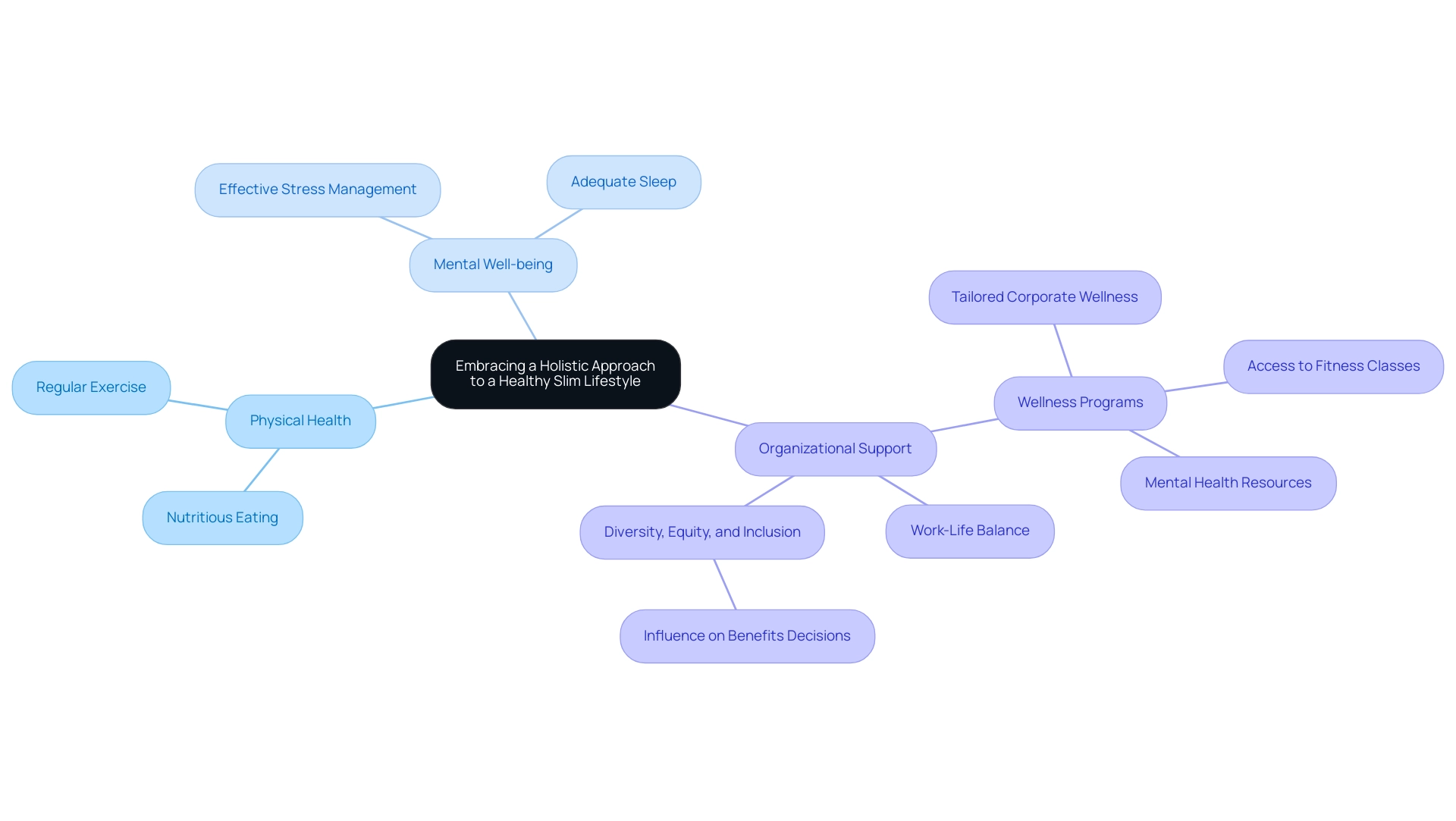
Effective Strategies for Sustainable Weight Loss and Maintenance
Achieving sustainable loss and maintenance relies on the implementation of effective strategies that seamlessly integrate into daily life. Start by establishing attainable objectives, aiming for a gradual loss of 1 to 2 pounds each week. Adopting a balanced diet that emphasizes whole foods, lean proteins, and ample fruits and vegetables is crucial for achieving a healthy slim physique.
Recent studies show that moderate reductions in fat intake can effectively support loss and are generally easier for individuals to maintain, aligning with evidence from case studies on low-fat diets that demonstrate significant loss outcomes when fat intake is moderated.
Regular physical activity is also essential; aim for a minimum of 150 minutes of moderate aerobic exercise each week, which not only assists in achieving a healthy slim body but enhances overall well-being. Tracking your progress can provide motivation and accountability—consider utilizing apps or journals to monitor dietary habits and exercise routines. Organizations play a pivotal role in this journey by offering resources such as nutrition workshops and fitness challenges, creating an environment that promotes wellness and well-being.
At Foresight Health Coaching, our comprehensive coaching services are tailored to meet the unique needs of both individuals and corporate groups. Our innovative solutions include personalized fitness coaching and custom program development delivered through our app, ensuring lasting lifestyle changes. Our wellness programs are tailored to address the specific requirements of clients, demonstrating our dedication to effective well-being management.
The weight loss market is anticipated to expand to USD 108.9 billion by 2031, indicating a rising emphasis on well-being management. However, it is important to be aware of safety concerns; as noted by Haller and Benowitz, the use of ephedrine alone or in combination with caffeine has been associated with a wide range of adverse effects on well-being.
By fostering these initiatives, HR Benefits Managers can inspire their teams to embark on a healthier lifestyle, ultimately leading to improved productivity and morale.
Our partnerships with diverse businesses further showcase our professional credibility, underscoring the effectiveness of our health coaching programs.
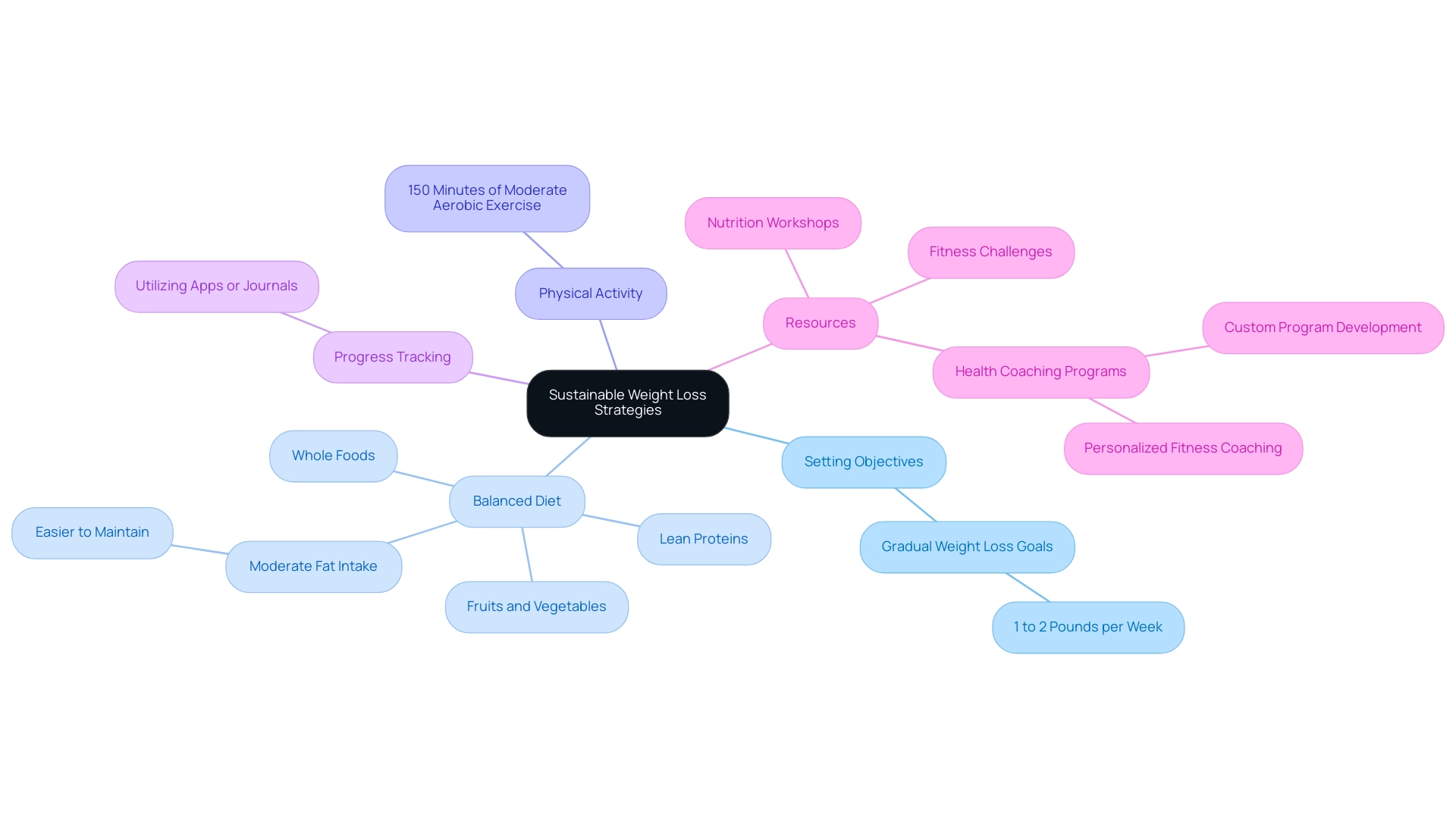
The Role of Mindful Eating in Achieving and Maintaining a Slim Lifestyle
Mindful consumption stands as a transformative practice for individuals aiming to achieve and sustain a healthy weight. It requires being fully present during meals, tuning into hunger cues, and savoring each bite. A key technique is to minimize distractions—such as phones and television—while dining, which not only enhances appreciation for food but also aids in recognizing feelings of fullness.
Research indicates that mindfulness can significantly influence dietary behaviors, with a recent study demonstrating that changes in mindful consumption over a year partially mediated improvements in fasting glucose levels, accounting for approximately 15% of the effect. A cluster randomized controlled trial involving 76 participants with overweight or obesity found that a 'mindful consumption' program combined with treatment as usual (TAU) significantly reduced emotional intake and improved external consumption behaviors at both posttreatment and follow-up. By encouraging conscious consumption among staff, organizations can assist them in making healthier dietary selections and minimizing emotional consumption, nurturing a more balanced relationship with food.
Furthermore, hosting workshops that focus on mindfulness and nutrition can empower employees to adopt these principles, creating a supportive environment for healthier lifestyle choices. As Jean Kristeller, an advocate for mindful eating, stated during a recent webinar, 'The journey toward better eating habits is greatly enhanced when we prioritize awareness around our food choices.
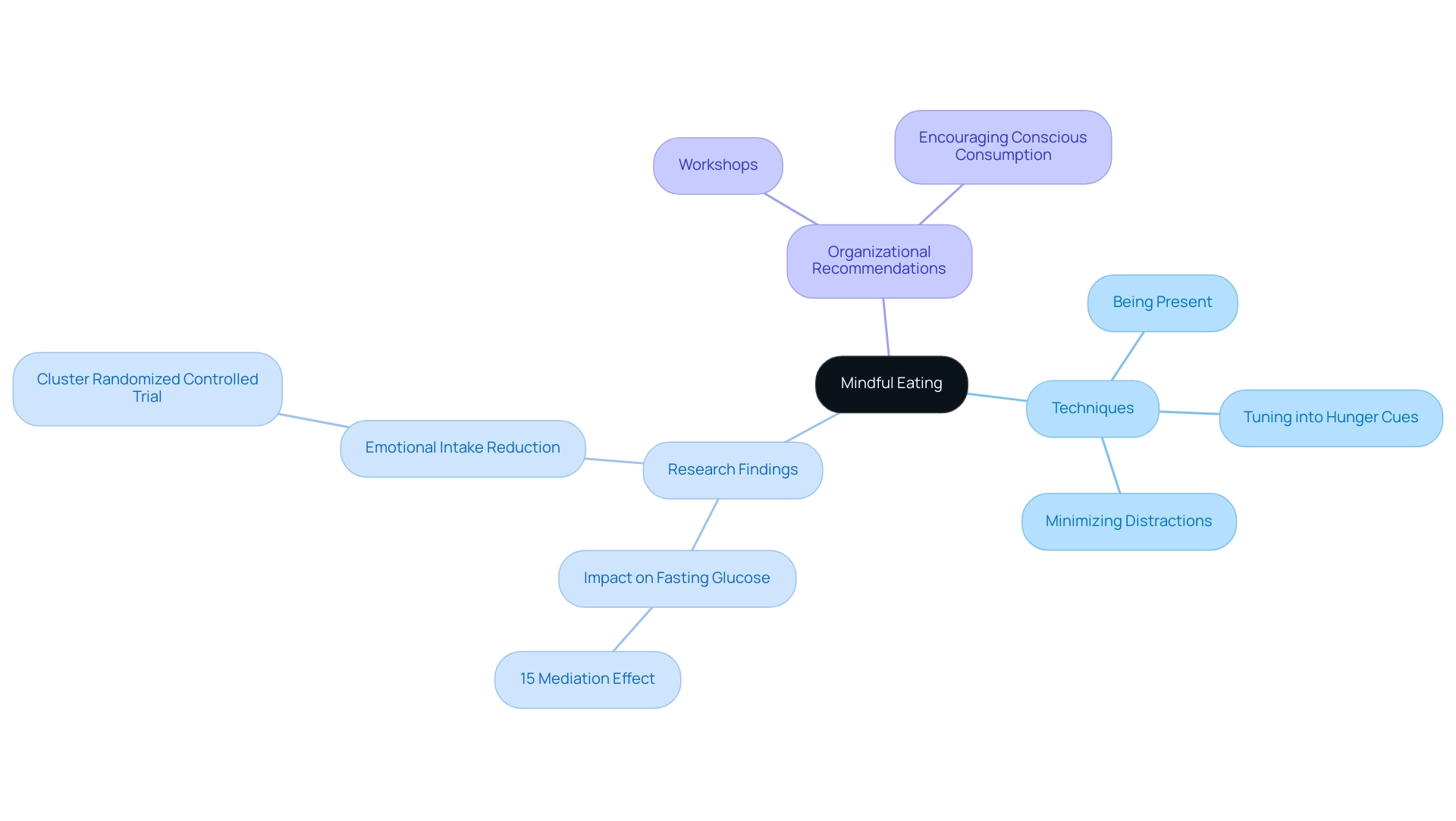
Understanding the Psychological Factors in Weight Management
Weight management transcends mere physical challenges; it is intricately linked to psychological factors such as motivation, self-discipline, and emotional triggers. Notably, a study found that 371 patients (92.2%) completed the intensive CBT-OB program, underscoring the significance of consistent follow-up in effective management of body mass. Recent research indicates that patients who achieved loss exceeding 5% benefited from more frequent consultations and shorter intervals between visits, reinforcing the critical role of ongoing engagement.
Our tailored corporate wellness programs at Foresight Health Coaching are designed specifically to enhance employee health, productivity, and cognitive performance through individualized support and exercise. These programs offer multifaceted benefits, including reduced absenteeism and lower healthcare costs, as investing in preventive care leads to significant savings on insurance premiums over time. The case study titled 'Determinants of Weight Loss in Individual Outpatient Care' revealed that a higher frequency of consultations and shorter intervals were associated with greater weight loss, emphasizing the need for regular interaction.
By recognizing patterns of emotional eating, individuals can develop healthier coping mechanisms that lead to sustainable changes. Organizations can play a pivotal role by offering access to mental wellness resources and workshops focused on emotional resilience. As Ms. H.M. Polonsky states, 'Understanding these psychological dynamics is essential for effective management of body composition,' allowing individuals to embrace their journey with confidence and determination.
By cultivating an environment that acknowledges these psychological challenges, companies empower their employees to achieve their wellness goals more effectively, ultimately fostering a culture of well-being and support. Join the ranks of top firms that have partnered with us to create a vibrant, engaged workforce that excels both mentally and physically.
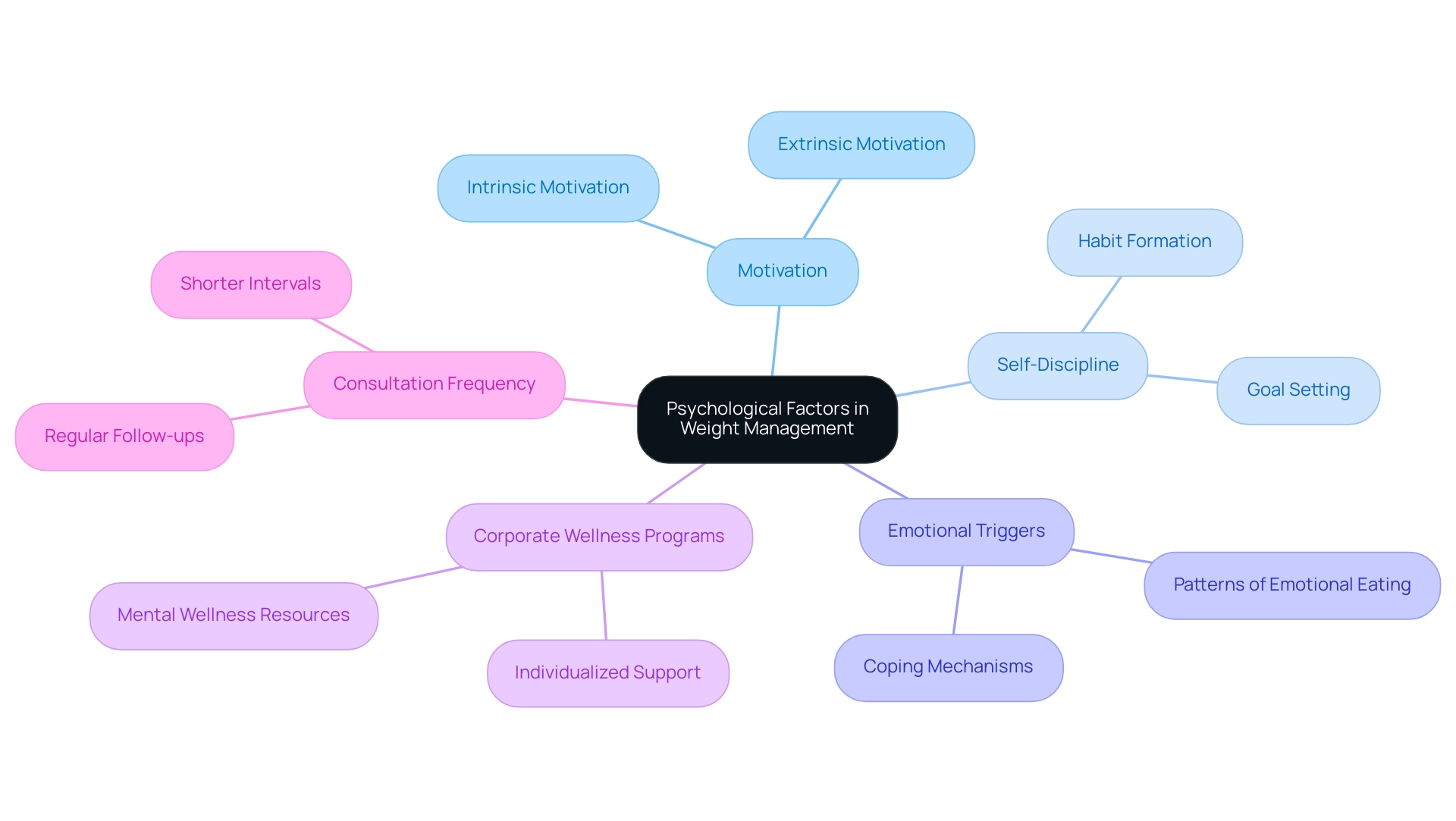
Leveraging Community Support for a Healthier Lifestyle
Harnessing community support can be a game changer on the path to achieving healthy weight loss goals and enhancing team culture. Participating in group activities, such as fitness classes and wellness challenges, not only promotes accountability but also fuels motivation among participants. A study by Wilson et al. (2014) involving 71 participants found that group fitness participation correlates with higher success rates, highlighting the power of teamwork in wellness initiatives.
By establishing wellness committees or support groups, organizations create a nurturing environment where employees can connect, share experiences, and celebrate successes. This sense of belonging fosters camaraderie and enhances team dynamics, ultimately contributing to a more vibrant workplace culture.
For instance, Memorial Hermann, a Houston-based institution recognized with the 2023 Foster G. McGaw Prize, exemplifies how a focused community wellness initiative can lead to significant improvements in outcomes. Their dedication to improving community well-being through four strategic pillars showcases the profound impact of collective efforts. Additionally, Basu Roy et al. observed that '78% of 69 survey participants concurred that community interests are well represented in council projects,' emphasizing the significance of community representation in wellness initiatives.
By collaborating with Foresight Wellness Coaching, organizations can offer transformative coaching opportunities, including a complimentary 7-day trial of our innovative app, motivating individuals to begin their wellness journeys. Providing platforms for employees to share their health journeys can motivate others to pursue their own paths toward wellness, reinforcing the idea that together, progress is not only possible but also profoundly rewarding.
Contact us now to discover how we can partner together to nurture a stronger and more resilient team culture.
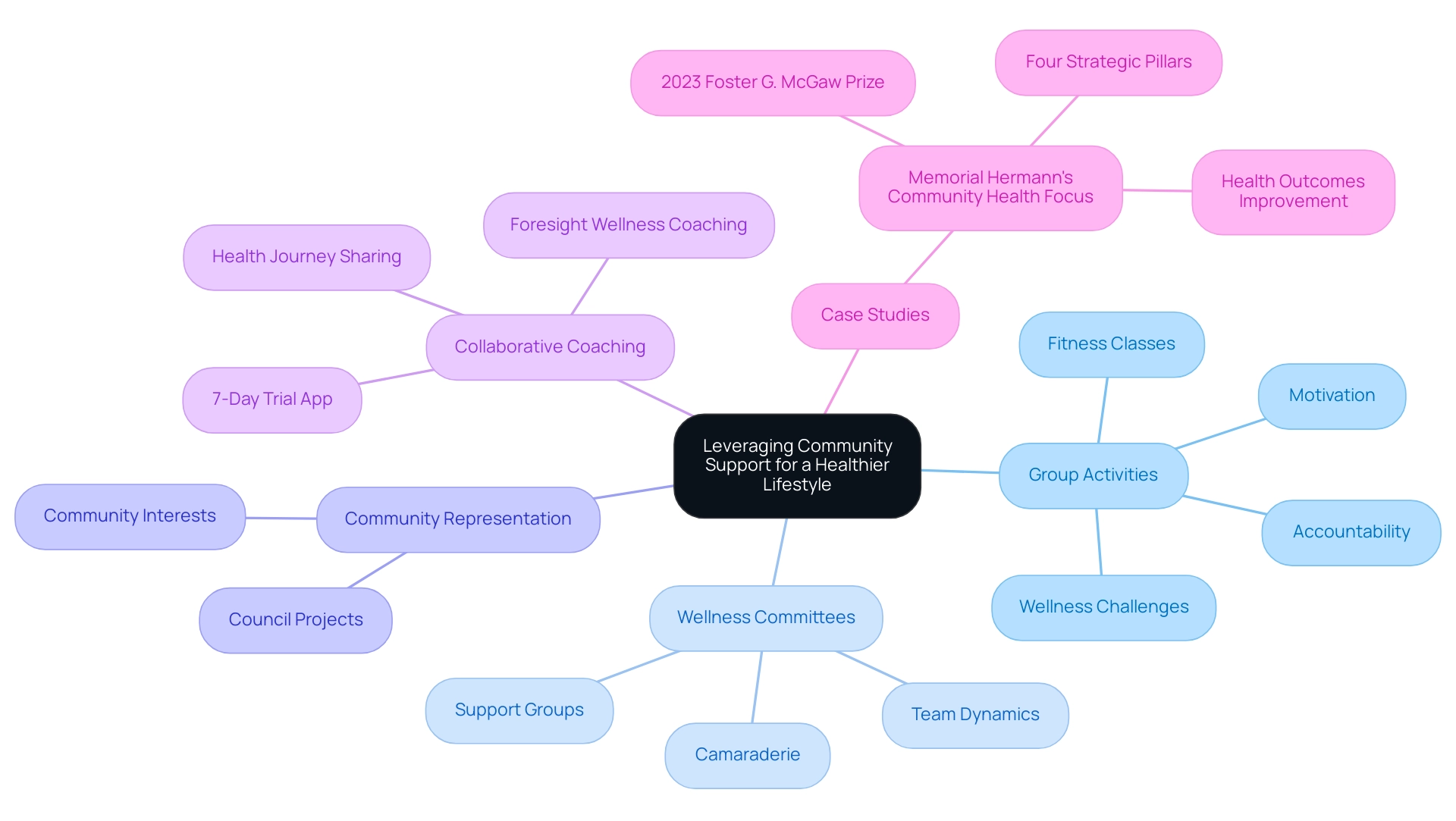
Conclusion
Creating a culture of health and well-being within an organization is not just beneficial; it is essential for sustaining employee engagement and productivity. By adopting a holistic approach that integrates physical health, mental well-being, and emotional resilience, HR Benefits Managers can lead the way in fostering an environment that supports sustainable weight management and overall wellness.
The strategies discussed, from tailored wellness programs to mindful eating practices, demonstrate that a comprehensive framework is crucial for achieving lasting results.
The psychological factors influencing weight management highlight the importance of ongoing support and community engagement. By recognizing emotional triggers and promoting accountability through group activities, organizations can empower employees to take charge of their health journeys.
The evidence presented underscores that when companies invest in their employees' well-being—through resources, workshops, and communal support—they not only enhance individual health outcomes but also cultivate a thriving workplace culture.
As the landscape of workplace wellness continues to evolve, the potential for positive change remains immense. Now is the time for HR Benefits Managers to champion these initiatives and prioritize the holistic health of their teams. By taking decisive action and leveraging the power of community, organizations can inspire their employees to embrace healthier lifestyles, ultimately leading to a more engaged, productive, and resilient workforce.
The journey toward a healthier workplace starts with a commitment to well-being—let this be the catalyst for transformative change.




